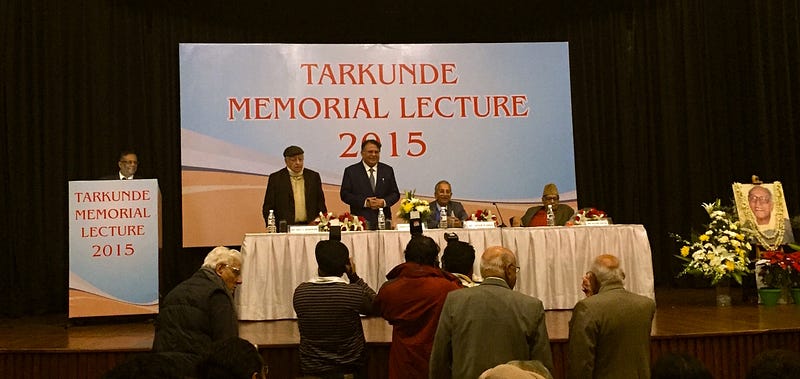“Every foundation you see is faulty, except the foundation of love…” — Hafez Shiraz(*)
With each passing year the annual lecture to commemorate Justice Tarkunde grows in stature. Justice Tarkunde was a former judge of the Bombay High Court but that was only one of his achievements. As Mr. Ashok Desai marked in his opening address, positions of respect and power are mere flags that can hang on a resume but Justice Tarkunde’s finest qualities were of the heart and mind. He recounted Justice Tarkunde’s commitment to radical humanism, civil liberties when emergency was declared and the rights of workmen during the heydays of labor litigation. It was befitting to Justice Tarkunde’s memory that the 2015 lecture was delivered by the retired Chief Justice of the High Court of Delhi, Justice A.P. Shah on Section 377 and the Naz Foundation Judgment.(**)
Justice A.P. Shah has several achievements in the development of law. For me, his decision alongwith Justice S. Murlidhar’s on the decriminalization of consensual homosexual sexual intercourse by reading down Section 377 of the Indian Penal Code, 1860 ranks highest amongst them. Giving a background to the Section 377, Justice Shah explained its archaic foundations. Foundations built on the need of medieval societies to produce offspring as a biological imperative to ensure security in the event of wars when the fables of Sodom and Gomorrah were first written. No wonder the very offence under the penal code sought to prevent, “sodomy”. This was a recurring feature of the lecture in which a large breadth of social commentary, scientific analysis and legal doctrine was explained with clarity and accessibility.
The lecture then proceeded to examine the moral justification of Section 377 in modern times. For this he noticed the developments in law in foreign jurisdictions such as the United Kingdom, United States, Nepal, Fiji and South Africa in which constitutional courts have struck down similar criminal provisions. Citing foreign judgments could have easily made the lecture a dull, dry, intellectual exercise but for the gentle wit of Justice Shah. Citing the change of laws in the United Kingdom after the Wolfenden Committee Report, he cited the apology extended to the pioneering, homosexual mathematician Alan Turing. Turing’s story brought to popular imagination by a recent biopic, the Imitation Game.

The finest parts of the lecture were focused on the concept of constitutional morality and the function of our courts. This was the very voice of the Naz Foundation judgment itself. Explaining how constitutional morality exists as a guarantee to minorities against public morality or the, “tyranny of majorities”, Justice Shah stated, “Constitutional morality is given under the constitution and it’s guarantees. It not only reflects public opinion but also shapes them. While a democracy is created by the rule of the majority it endures because of the observance of fundamental rights.”. Such eloquence was soon met with anguish as Justice Shah analyzed the Supreme Court’s Koushal Judgment which reversed and set aside the Naz Judgment given by the High Court of Delhi.(***)
Analyzing judgments commentators often compromise intellectual honesty or the collective contributions of the Supreme Court. These are dangers which can be avoided only through calm reasoning. Providing a balanced and candid criticism of the Koushal Judgment, Justice Shah stated at the very outset that the Supreme Court turned away from, “decades of its history” in failing to, “recognize the counter majoritarian role of the court which cannot be solely left to legislative choice”. He sharpened his criticism, stating that the Supreme Court adopted a false reasoning in stating that Section 377 had historically resulted in the prosecutions of only about 200 persons, and it effected a miniscule percentage of India’s population. Such an argument when used to put an onus and subsequent failure to evidence factual deprivation of fundamental rights, failed to appreciate the vast chilling effects and the harm caused by perception in disfranchising sexual minorities from society. A touching illustration was cited as to how collective readings of the Naz Foundation judgment were organized by LGBTQs to reassure themselves that they were no longer considered criminals by the law. Towards the end Justice Shah ended his analysis by stating that the Supreme Court, “did not even engage of conditional morality and hence missed the very basis of the Naz Judgment”.
Showing the way ahead, Justice Shah firmly stated that Section 377 needs to go. He stated that such changes in law could occur in three ways. The first is through the process of amendment in a written constitutional text itself. Second by reading fundamental protections expansively by a Court as was done in the Naz Foundation Case. It was stated that given, the Supreme Court’s subsequent judgment in the NALSA case(****) where it recognized the third gender, and the pendency of a curative petition on the Koushal Judgment this can still be done. The third method was through legislative repeal on which the recent announcement by Shashi Tharoor to introduce a private members bill to amend Section 377 was appreciated. However, Justice Shah underscored a sense of urgency stating that, “[i]t cannot be an never ending game of toss and catch between the courts and the legislature. Both of them must act independently and act they must”.
Justice Shah ended his lecture with a quote from Hafez Shiraz. As the hall burst into applause I felt warmth on the first day of a Delhi winter.
Endnotes:
* Justice Shah ended with this quote. On further research I found Faiz Ahmed Faiz also quoted this in his acceptance speech of the Lenin Prize in 1962. The full text of Faiz’s speech seems to be unavailable online.
** A copy of the Naz Foundation judgment can be found here.